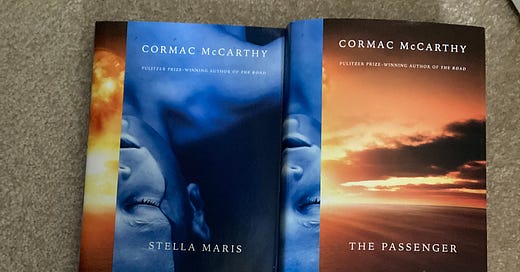Cormac McCarthy died on June 13th. Given that he was my favorite author, and I just finished reading The Passenger and Stella Maris (the two novels he released last year),1 I wanted to write something about him. Not because I have anything uniquely insightful to add – others have already written better tributes – but because it seemed appropriate to honor the passing of the man regarded by many as the greatest living American writer, a man whom Harold Bloom called “the worthy disciple” of Faulkner and Melville.
Both of those authors influenced McCarthy’s masterpiece, Blood Meridian, or The Evening Redness in the West (a title which may remind some readers of Moby Dick, or The Whale). Widely considered the most violent novel in American literature, Blood Meridian is an unsettling window into the depths to which the human soul is capable of descending. In it, we see McCarthy’s deeply tragic view of both human nature and the nature of the world on full display. The novel is shocking to modern readers without trying to shock. It opens our eyes to something we try very hard to forget.
Blood Meridian answers the question, “Why is there war?” by denying the question. There is war because human beings fight wars. There is war because human beings are warlike. The real question, the question McCarthy doesn’t ask, is, “Why is there peace?” But while McCarthy doesn’t ask that question, or the related question, “Why is there civilization?” he seems to intuit some of what makes civilization possible. His tragic view of human life does include the possibility of redemption. This is most clearly evidenced in the book of his that is least like Blood Meridian – 2006’s The Road.




